George Washingtons Indispensable Men
GEORGE WASHINGTONS INDISPENSABLE MEN
The 32 Aides-de-Camp
Who Helped Win
American Independence
Arthur S. Lefkowitz
Guilford, Connecticut
Published by Stackpole Books
An imprint of The Rowman & Littlefield Publishing Group, Inc.
4501 Forbes Blvd., Ste. 200
Lanham, MD 20706
www.rowman.com
Distributed by NATIONAL BOOK NETWORK
800-462-6420
Copyright 2003 by Arthur S. Lefkowitz
First Stackpole Books Paperback Edition, 2018
All rights reserved. No part of this book may be reproduced in any form or by any electronic or mechanical means, including information storage and retrieval systems, without written permission from the publisher, except by a reviewer who may quote passages in a review.
British Library Cataloguing in Publication Information Available
Library of Congress Cataloging-in-Publication Data Available
ISBN 978-0-8117-3791-3 (paperback)
ISBN 978-0-8117-6808-5 (e-book)
ISBN 978-0-8117-1646-8 (hardback)
 The paper used in this publication meets the minimum requirements of American National Standard for Information SciencesPermanence of Paper for Printed Library Materials, ANSI/NISO Z39.48-1992.
The paper used in this publication meets the minimum requirements of American National Standard for Information SciencesPermanence of Paper for Printed Library Materials, ANSI/NISO Z39.48-1992.
Printed in the United States of America
This book is dedicated to my uncle
Pfc. David Lefkowitz
killed in action in the Philippines, May 7, 1945
My father served on the battleship Missouri during World War II and I found a letter he wrote home from Tokyo Bay the day Japan surrendered, in which he spoke of his younger brother David:
When the flag was raised then we knew the war was finally over. We waited for hours for this event and when it did happen, I said a silent prayer for my brother Dave. Not only did I lose a brother but a true friend. Whenever I think of him my head greaves heavy. I guess that is the way of life, some have to go before their time and I will never forget him as long as I live.
The science or art of War, requires a freedom of thought and leisure to reflect upon the Various incidents that dayly occur, which cannot be had where the whole of ones times is engrossed in Clerical employments... It is like a merchandise of small Wares.
Gen. Nathanael Greene to George Washington,
July 25, 1776
COVER ILLUSTRATION
T he painting shown on the cover of this book is titled The Capture of the Hessians at Trenton by John Trumbull. It was started by Trumbull in London in 1786 and completed following his return to America in 1789. The artists imagined composition is based on the American victory at Trenton, New Jersey, on December 26, 1776. The towns garrison consisted of 1,600 Hessian troops under the command of Col. Johann Rall, who was mortally wounded in the battle.
Trumbulls painting is appropriate for this book as several of Washingtons aides-de-camp are depicted in his work. They are Tench Tilghman, who is shown on horseback immediately behind Washington. Behind Tilghman is Robert Hanson Harrison, who served as an aide to the Commander-in-Chief for more than six years. Holding the severely wounded Rall is William Stephens Smith. Smith was an aide to Gen. John Sullivan at the time but joined Washingtons staff later in the war.
The artist, John Trumbull, was also one of Washingtons aides. Trumbull capitalized on his close association with Washington throughout his lifedespite the fact that he served as one of the generals aides for only nineteen days. Trumbull died in 1843. By then there were few people alive who knew of his brief tenure on Washingtons staff.
Painting reproduced courtesy of the Yale University Art Gallery.
CONTENTS
LIST OF MAPS
Scene of Operations around New York 1776
Central New Jersey and 1778 Philadelphia Evacuation
The Siege of Yorktown: September 30October 19, 1781
PREFACE
O ne of the pleasures of studying history is that you are always meeting new and interesting people. I was introduced to George Washingtons Revolutionary War aides-de-camp while I was researching my book about the 1776 retreat of Washingtons army across New Jersey. My study showed that Washington had a personal staff who reported directly to him. They had different titles including aide-de-camp, military secretary, extra aide-de-camp, assistant military secretary, recording secretary, and volunteer aide-de-camp, and I wondered what the different titles meant. I got to read some of their letters and orders, which made me curious to know who these men were and what they did for Washington, especially since they sometimes seemed to be operating independently of him. Further investigation showed that most of them had been lawyers, doctors, or businessmen before the war. This unplanned introduction to Washingtons aides-de-camp made me curious to learn more about who they were and exactly what they did at headquarters.
My inquiry into the subject led me to the two books that had been written about Washingtons aides-de-camp. Both were obscure and long out-of-print. One was authored by Emily Stone Whiteley and entitled Washington and His Aides-de-Camp. It was published in 1936. The other was With Pen and Sword, dating from 1952. I was able to locate copies of both books and read them. The Whiteley book was the better of the two, which is the kindest thing I can say about it. Ms. Whiteley naively reported stories about Washington and his aides without questioning their basis of fact. She told her gossipy stories in a fantasy Revolutionary War backdrop devoid of the grim realities, which included avarice, mismanagement, mutinies, starvation, and petty jealousies over rank and promotion. In one regard, however, I found Ms. Whiteleys book not far from the mark. It was her portrayal of Washington and his aides as a Revolutionary War version of King Arthur and his Knights of the Round Table. I came to agree with her appraisal that Washington and his aides were a close-knit group of courageous and honorable men. But Washingtons aides lived through a very complicated and difficult time, and I wanted to look beyond the simplistic yarns spun out by Ms. Whiteley. As a result I decided to embark upon my own voyage of historical discovery.
As I began researching Washingtons aides, I soon realized why this interesting subject had been neglected by historians. One reason for it, is that it is a complicated topic due to the numerous men identified as being Washingtons aides-de-camp. Unraveling who was an aide to Washington and who was not was challenging, and when I finished I still had thirty-two names. This is a large number of people to write about in a single volume, and I wanted to include all of them without confusing or boring my readers. I hope this book accomplishes my goals. Another reason the subject has received little attention is that many of the men who served in the position are obscure figures in American history, so that researching them was a problem. I wanted to do more than just record the basic facts of their lives, and I felt that the key to understanding them was to find their personal letters. But I was frustrated to find that their correspondence had been scattered all over the world, and locating their remaining letters was going to be a difficult task. I was also interested in writing about how Washingtons headquarters operated during the Revolutionary War. For example, could a gentleman simply walk into army headquarters and talk to General Washington? Perhaps they were first referred to one of his aides whose job included screening visitors. In the course of my research I uncovered only two well documented sources of information about Washingtons aides. They were a chapter in a 1924 book entitled

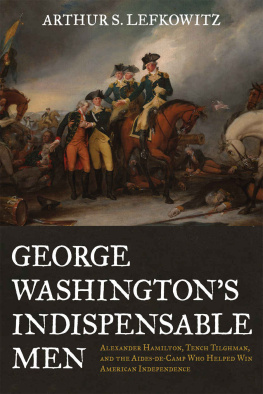

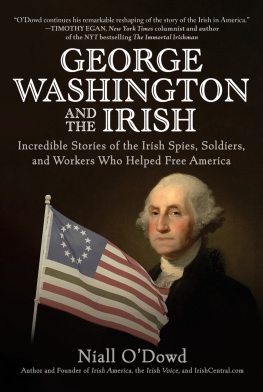
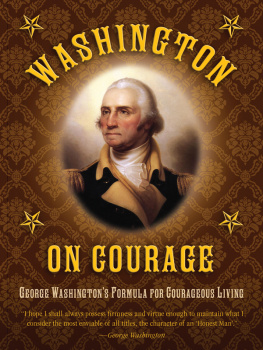
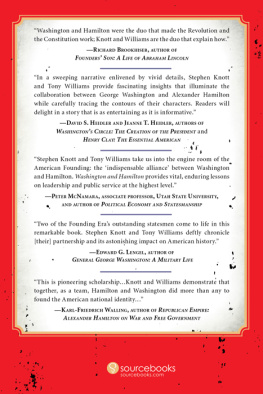
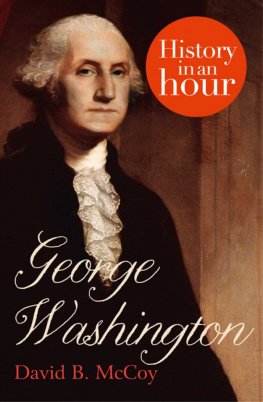
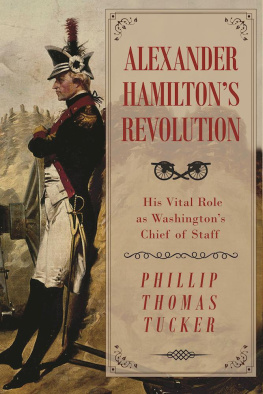

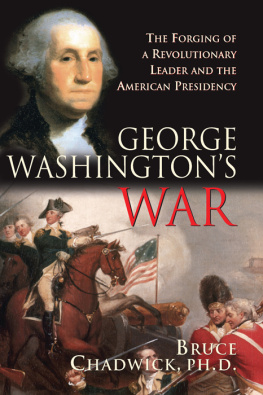


 The paper used in this publication meets the minimum requirements of American National Standard for Information SciencesPermanence of Paper for Printed Library Materials, ANSI/NISO Z39.48-1992.
The paper used in this publication meets the minimum requirements of American National Standard for Information SciencesPermanence of Paper for Printed Library Materials, ANSI/NISO Z39.48-1992.